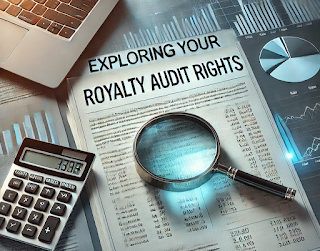When it comes to royalty audits, who can be audited is often clear-cut - but who holds the keys to the documents, and what happens if those doors stay closed, is another matter. Entities bound by contractual or statutory obligations to pay royalties are the most obvious targets for royalty audits, but sometimes the party holding the purse strings isn’t the same one a rightsholder can audit. In the recorded music industry, for instance, producers are usually paid directly by an artist’s record company, yet the standard audit rights granted to producers include only the right to audit the artist, not the record label that’s calculating and issuing the payments. For a producer, learning that they don’t have direct access to their income source can be frustrating. However, there are strategies to gain more complete audit rights - particularly for music producers - so it’s wise to consult counsel before concluding that an audit is off-limits.
If you’re lucky enough to have audit rights in your contract, this can give you a valuable avenue to verify royalty payments, but some audited parties might not comply eagerly. They may delay or attempt to restrict the audit’s scope. Here, it’s important to understand the impact of such actions on business relationships. Contrary to the widespread myth that exercising audit rights damages the relationship, this is rarely the case. Often, it has no effect at all. In fact, if there’s a solid working relationship in place, it can actually strengthen trust and transparency, showing that both parties take accountability seriously. Audits usually only strain relationships when other unresolved issues are already at play.
A counterparty who refuses to provide access to certain documents might have legal ground to do so, especially if the audit request exceeds the contract’s defined scope. Some contracts specifically limit the frequency, scope, or type of documents that can be reviewed, allowing the counterparty to challenge requests for anything outside these boundaries. However, while such refusals are sometimes justifiable, they can be shortsighted - an unwillingness to cooperate can signal potential issues that may actually damage the counterparty’s reputation more than the rightsholder’s.
Confidentiality is often cited as a reason to restrict access. For example, some parties may insist on sharing only summaries rather than full financial documents, claiming confidentiality concerns. This tactic can create friction, yet most rightsholders understand confidentiality obligations and will comply with reasonable nondisclosure agreements. Moreover, audit provisions are frequently designed to ensure that sensitive information is protected. By leveraging these protections, an audited party can ease concerns about data security while still demonstrating cooperation.
Another common strategy among counterparties is to impose timing restrictions. For instance, many contracts allow audits only once every year or two, typically giving the rightsholder access only to recent records. Such limits are often used to prevent overreach and reduce the administrative burden on the counterparty. Additionally, some contracts require prior notice of an audit request - sometimes months in advance - which may deter impulsive requests while still allowing time to prepare.
If you’re a rightsholder, consider that a refusal to cooperate might not end the audit entirely. Many meaningful audit procedures can be completed without full cooperation. Independent analyses, or “unilateral audits,” can examine public or third-party data to gauge whether reported royalties seem accurate. This type of analysis, while not as exhaustive as a cooperative audit, can still identify discrepancies that might encourage further dialogue.
For those without explicit audit rights, it’s always worth asking, as sometimes even unentitled parties may agree to a limited review. In the music industry, for instance, a producer might not have the right to audit a record label directly, but could potentially negotiate limited audit rights through the artist or explore indirect ways of ensuring fair royalties. This approach requires creativity and, often, the input of legal counsel to navigate non-standard situations.
Examples of Royalty Audit Counterparties by Industry:
Music and Entertainment
- Record labels (audited by artists)
- Music publishers (audited by songwriters)
- Streaming services (audited by performing rights organizations)
Publishing
- Book publishers (audited by authors)
- News organizations (audited by freelance journalists)
Technology
- Software licensors (audited by licensees)
- App developers (audited by platform hosts)
Biotech and Pharma
- Patent licensees (audited by patent holders)
- Research partners (audited by academic institutions)
Consumer Goods
- Franchisees (audited by franchisors)
- Apparel manufacturers (audited by brand owners)
Gaming and Digital Media
- Game publishers (audited by game developers)
- Ad revenue partners (audited by content creators)
Energy
- Solar tech licensees (audited by patent holders)
- Oil companies (audited by landowners)
Sports
- League merchandise partners (audited by athletes)
- Broadcasters (audited by leagues)
By using audits effectively and respecting the boundaries of each party’s rights, rightsholders and counterparties alike can create a working relationship built on transparency and mutual trust. When conducted thoughtfully, audits not only ensure accurate royalty payments but reinforce confidence, setting the stage for long-term, cooperative partnerships.



